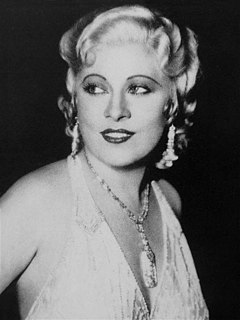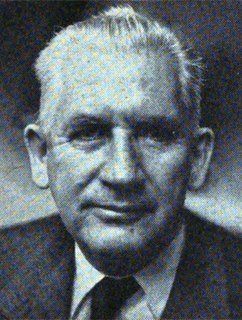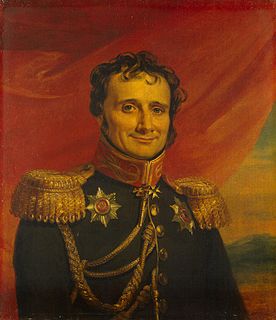Top 262 Napoleon Quotes & Sayings - Page 5
Explore popular Napoleon quotes.
Last updated on April 20, 2025.
Anyone who clings to the historically untrue-and thoroughly immoral-doctrine that, 'violence never settles anything' I would advise to conjure the ghosts of Napoleon Bonaparte and the Duke of Wellington and let them debate it. The ghost of Hitler could referee, and the jury might well be the Dodo, the Great Auk and the Passenger Pigeon. Violence, naked force, has settled more issues in history than has any other factor, and the contrary opinion is wishful thinking at its worst. Breeds that forget this basic truth have always paid for it with their lives and freedom.
I am not a historian, but I find myself being more and more fascinated by history and now I find myself reading more and more about history. I am very interested in Napoleon, at the present: I'm very interested in battles, in wars, in Gallipoli, the First World War and so on, and I think that as I age I am becoming more and more historical. I certainly wasn't at all in my early twenties.
But even friendship like our heroes' Exist no more; for we've outgrown All sentiments and deem men zeroes-- Except of course ourselves alone. We all take on Napoleon's features, And millions of our fellow creatures Are nothing more to us than tools... Since feelings are for freaks and fools. Eugene, of course, had keen perceptions And on the whole despised mankind, Yet wasn't, like so many, blind; And since each rule permits exceptions, He did respect a noble few, And, cold himself, gave warmth its due.
General Napoleon says that 'Never interrupt your enemy when he is making a mistake.' Well, I suggest doing the opposite: Interrupt your enemy when he is making a mistake. Don't be opportunist; don't benefit from the weakness of your enemy! Be just even to your enemy! Try to find a way to defeat him without harming him; prove to be as intelligent as to find such a way! Only then, your victory will be meaningful and honourable!
My mom didn't teach me about Marco Polo. She didn't teach me about Napoleon. She didn't teach me about any of that. But she did teach me how to survive and to be a good person. And you need to be a strong woman to do that. She's the biggest person in my life. She's my Virgin Maria. That's why I love religion so much.
More people saw me than saw Napoleon, Lincoln and Cleopatra. I was better known than Einstein and Picasso. ... I changed the fashion of two continents. The style of the Gay Nineties became the rage ... women were trying to walk and talk like me. Women became more sex-conscious - sex was out in the open and fun.
The Parisian is to the French what the Athenian was to the Greeks: no one sleeps better than he, no one is more openly frivolous and idle, no one appears more heedless. But this is misleading. He is given to every kind of listlessness, but when there is glory to be won he may be inspired with every kind of fury. Give him a pike and he will enact the tenth of August, a musket and you have Austerlitz. He was the springboard of Napoleon and the mainstay of Danton. At the cry of "la patrie" he enrols, and at the call of liberty he tears up the pavements. Beware of him!
It is only possible to succeed at second-rate pursuits - like becoming a millionaire or a prime minister, winning a war, seducing beautiful women, flying through the stratosphere, or landing on the moon. First-rate pursuits - involving, as they must, trying to understand what life is about and trying to convey that understanding - inevitably result in a sense of failure. A Napoleon, a Churchill, or a Roosevelt can feel himself to be successful, but never a Socrates, a Pascal, or a Blake. Understanding is forever unattainable.
Was it possible that Napoleon should win the battle of Waterloo? We answer, No! Why? Because of Wellington? Because of Blucher? No! Because of God! For Bonaparte to conquer at Waterloo was not the law of the nineteenth century. It was time that this vast man should fall. He had been impeached before the Infinite! He had vexed God! Waterloo was not a battle. It was the change of front of the Universe!
It is all a question of sensitiveness. Brute force and overbearing may make a terrific effect. But in the end, that which lives by delicate sensitiveness. If it were a question of brute force, not a single human baby would survive for a fortnight. It is the grass of the field, most frail of all things, that supports all life all the time. But for the green grass, no empire would rise, no man would eat bread: for grain is grass; and Hercules or Napoleon or Henry Ford would alike be denied existence.
But the doctors in the past, as the review of the evidence showed, branded Jenner, Semmelweis, Oliver Wendell Holmes, Sr., Pasteur, Lister, Koch and Keen as charlatans...Napoleon said that war is too important to be left to the generals. We go on the assumption in the Senate that foreign relations are too important to be left to the diplomats...this question (on a novel cancer cure) is too important to leave purely to doctors.
Washington was a typical American. Napoleon was a typical Frenchman, but Lincoln was a humanitarian as broad as the world. He was bigger than his country - bigger than all the Presidents together. We are still too near to his greatness,' (Leo) Tolstoy (in 1908) concluded, 'but after a few centuries more our posterity will find him considerably bigger than we do. His genius is still too strong and powerful for the common understanding, just as the sun is too hot when its light beams directly on us.' (748)
It may be a blessing in disguise...Something happened a long time ago in Haiti, and people might not want to talk about it. Haitians were originally under the heel of the French. You know, Napoleon the third, or whatever. And they got together and swore a pact to the devil. They said, we will serve you if you will get us free from the French. True story. And so, the devil said, okay it's a deal. Ever since they have been cursed by one thing after the other.
Give people pride and they'll live on bread and water, bless their exploiters, and even die for them. Self-surrender is a transaction of barter: we surrender our sense of human dignity, our judgement, or moral and aesthetic sense for pride. If there is pride in being free, we are ready to die for liberty. If there is pride to be derived from an identification with a leader, we grovel in the dust before a Napoléon, Hitler or Stalin and are ready to die for him. If there is a distinction in suffering we search for martyrdom as for hidden treasure.
To the chefs who pioneered the nouvelle cuisine in France, the ancienne cuisine they were rebelling against looked timeless, primordial, old as the hills. But the cookbook record proves that the haute cuisine codified early in this century by Escoffier barely goes back to Napoleon's time. Before that, French food is not recognizable as French to modern eyes. Europe's menu before 1700 was completely different from its menu after 1800, when national cuisines arose along with modern nations and national cultures.
It is certainly of great importance for a general to keep his plans secret; and Frederick the Great was right when he said that if his night-cap knew what was in his head he would throw it into the fire. That kind of secrecy was practicable in Frederick's time when his whole army was kept closely about him; but when maneuvers of the vastness of Napoleon's are executed, and war is waged as in our day, what concert of action can be expected from generals who are utterly ignorant of what is going on around them?
To us, it is incomprehensible that millions of Christian men killed and tortured each other because Napoleon was ambitious or Alexander was firm, or because England's policy was astute or the Duke of Oldenburg was wronged. We cannot grasp what connection such circumstances have the with the actual fact of slaughter and violence: why because the Duke was wronged, thousands of men from the other side of Europe killed and ruined the people of Smolensk and Moscow and were killed by them.
High culture is nothing but a child of that European perversion called history, the obsession we have with going forward, with considering the sequence of generations a relay race in which everyone surpasses his predecessor, only to be surpassed by his successor. Without this relay race called history there would be no European art and what characterizes it: a longing for originality, a longing for change. Robespierre, Napoleon, Beethoven, Stalin, Picasso, they're all runners in the relay race, they all belong to the same stadium.
Great pals we've always been. In fact there was a time when I had an idea I was in love with Cynthia. However, it blew over. A dashed pretty and lively and attractive girl, mind you, but full of ideals and all that. I may be wronging her, but I have an idea that she's the sort of girl who would want a fellow to carve out a career and what not. I know I've heard her speak favourably of Napoleon. So what with one thing and another the jolly old frenzy sort of petered out, and now we're just pals. I think she's a topper, and she thinks me next door to a looney, so everything's nice and matey.
It is a great mistake for presidents and other leading executives of organizations having branches throughout the country to chain themselves to their desks at headquarters and send out rigid instructions to those in charge of distant branches and offices. Because a man sits in a palatial office in New York or Chicago or Philadelphia or Detroit and draws a big salary, it does not necessarily follow that he knows better than the man on the spot what ought to be done.... Paul, Caesar, Napoleon did not merely sit at home and issue long-range instructions.
Fashion has been collected and exhibited for many years. People were picking up clothing of famous individuals, like Marie Antoinette's shoe or Napoleon's hat. That part of the resistance to having fashion in museums had to do with it being associated with femininity, and with the female body. Yet, as early as the 18th century, some people were recognizing that just as you collected art, you, might think about collecting fashion for museums, because it would provide insight into the way people thought about their lives and, and the way they envisioned themselves.




















